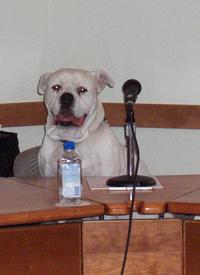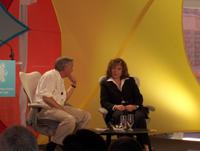I was asked to participate in a panel discussion today at Infinity Radio. The topic of the panel was Radio in 2010. The idea was to attempt to figure out what a radio station will be like at the end of the decade.
I have some strong feelings on this subject. I think the radio industry continues to believe that its spectrum (the AM and FM bands and specifically the channels on those bands) is its most important asset. Unfortunately for the radio industry, in the digital world bandwidth is bandwidth and how it gets delivered (over the air, over a wire, satellite, etc) is not a long term proprietary advantage.
The best way of illustrating this is to look at Internet radio. Today, it’s just as easy to listen to WFUV on my laptop as it is on my car radio. The sound quality is the same if I have a broadband connection to my laptop. If I live in NYC, then I can get that broadband connection almost anywhere by borrowing someone’s WiFi connection. With the right software, a WiFi enabled PDA can be as good or better than a car radio in most parts of NYC today.
This doesn’t mean that the radio industry doesn’t have a better product today and will for a long time to come. Every car comes with a radio that is simple to use. WiFi isn’t ubiquitous and free outside of the most dense major metropolitan areas. And it isn’t clear that WiFi or any other form of bandwidth will ever really be free and ubiquitous the way the radio spectrum is.
But the trendline is going in a clear direction. High bandwidth IP is going to be everywhere someday pretty soon. In that world, the radio industry’s spectrum is not the proprietary advantage that it is today.
So what are the radio industry’s key long term advantages?
First, the radio industry understands how to program audio better than anyone else. They understand the formats, the economics, the demographics, and they continue to experiment with new kinds of programming.
Second, the radio industry understands how to sell advertising to monetize free audio programming. They’ve been doing it for years and they have the clients, the relationships, and the skills to continue dominating that aspect of the business.
Third, the radio industry understands how to promote new music and they get paid a lot of money by the music industry to do that. They own this business today and they can own it in the future if they play their cards right.
Fourth, radio is where the most interactive forms of political (and other) discussions happen in major media (obviously this doesn’t include blogs). Regardless if you like or hate Rush Limbaugh or Al Franken, you have to admit the talk radio format and the interactive nature of the call-in listener is a powerful forum for political dialog. It’s true in sports too, just listen to Mike and the Mad Dog on WFAN. It’s true in stocks as well, listen to Jim Cramer.
And last, and the most important advantage, radio has a branded relationship with its listeners that is strong, familiar, and meaningful. My daughters won’t let me drive them around without putting on Z100. They like Z100, they know its personalities, its ads, its music, its concerts, and its location on the dial. I suspect that most people who drive to work every day have a relationship like that with a radio station.
What are radio’s near term issues other than the commoditization of its spectrum assets? Well for one, radio has become formulaic and boring to many listeners. In the NYC market, outside of the big formats like Urban, Top 40, and Classic Rock, there isn’t much to listen to on the FM band.
Another big issue is the loss of listeners, particularly in the car, to satellite radio. Satellite charges a monthly fee and does not need advertising to support it. I think the rise of satellite radio is mostly because it offers a broader array of music formats than the FM band and consumers really do want choice.
So like the classic karate move, radio needs to use the strength of its enemies and use it to its advantage. Those strengths are more bandwidth in more forms of delivery on more devices. So if I owned a radio station today, I’d invest heavily in digital delivery. To me that means Internet radio and HD Radio.
Internet radio lets a station put its audio programming out there in competition with other Internet radio competitors. I’d promote the Internet radio stream heavily on the traditional radio station and encourage listeners to log on and bookmark the station. I’d make deals with iTunes, Rhapsody, and the other digital music platforms to have the Internet radio station featured prominently. I’d make deals with Microsoft Media Server and the other home entertainment platforms to get the Internet radio station featured prominently on those devices too.
HD Radio allows for multiple audio streams on a single channel. I’d deploy HD Radio and quickly develop new formats that offer more diversity for the listeners. If I was Z100 and had a classic Top 40 listener, then I’d develop new supplemental channels that skewed older and younger in the way that Viacom did with MTV, VH1, and Nickelodeon. I’d promote those channels aggressively on Internet radio to build out the listener bases for the new formats.
The new emerging consumer devices, (iPod, Treo, cellphone, Gameboy, etc) are going to have radios in them. I’d create a consumer electronics group to go make deals with all these manufacturers to insure that there are stored preset buttons on all of these devices and I’d make sure that they come preconfigured with my stations on them when they are sold in my local markets.
There’s a lot more that I’d do, but I think you all get the point. I’d reinvent the radio business as an audio programming delivery company and organize it to be relevant on as many digital devices and over as many forms of audio delivery as one can imagine. It’s not as simple a business, but it could be a lot more valuable over time than a radio station is today.
The good news is that – based on my morning at Infinity – at least some radio companies have woken up. They are moving in this direction, probably a lot faster than we all might think.
 There was a great breakfast panel today talking about the future of advertising.
There was a great breakfast panel today talking about the future of advertising.
